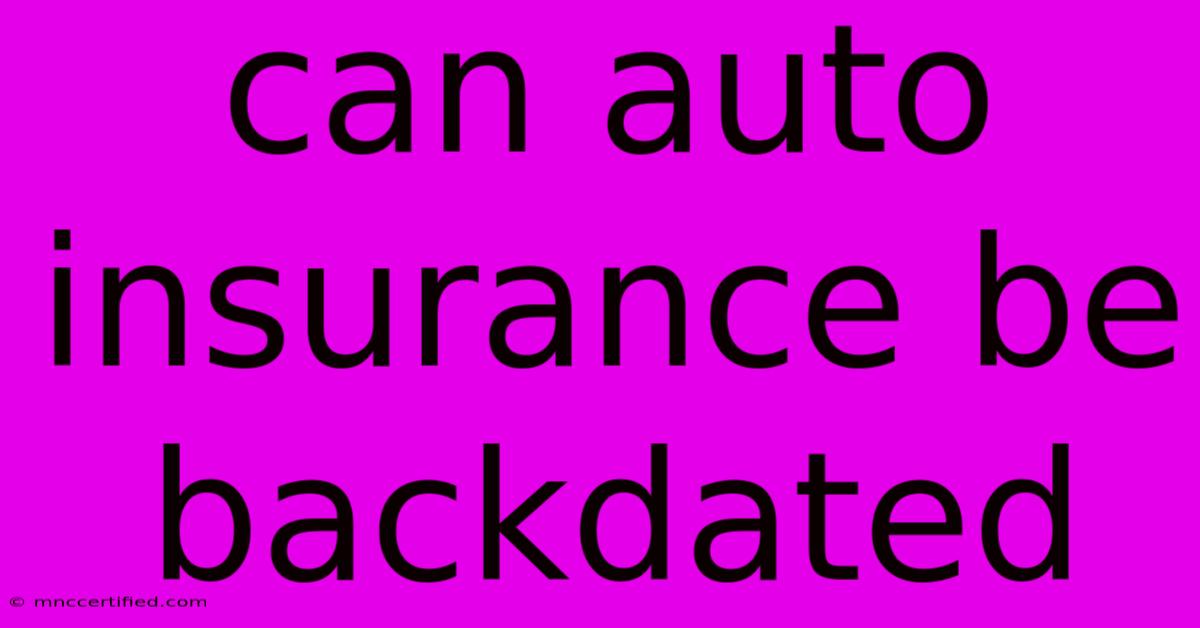Can Auto Insurance Be Backdated

Table of Contents
Can Auto Insurance Be Backdated? A Comprehensive Guide
Thinking about getting car insurance but missed the deadline? Many people wonder, "Can auto insurance be backdated?" The short answer is: sometimes, but it's complicated and not always possible. This comprehensive guide will explore the intricacies of backdating car insurance, explaining when it might be an option and the potential hurdles involved.
Understanding the Risks of Driving Without Insurance
Before diving into the possibility of backdating, it's crucial to understand the severe consequences of driving without insurance. Driving uninsured is illegal in most jurisdictions and can lead to hefty fines, license suspension, or even jail time. More importantly, if you're involved in an accident without insurance, you'll be personally liable for all damages, potentially leading to significant financial ruin.
Why Backdating is Rarely a Simple Solution
Insurance companies are businesses that operate on risk assessment. Backdating implies a retroactive agreement, meaning they are covering a period where they had no knowledge of the risk involved. This presents several challenges:
- Proof of Coverage: The most significant obstacle is providing concrete evidence that you needed coverage during the backdated period. Insurance companies usually require significant documentation.
- Risk Assessment: The insurer needs to assess the risk they were unknowingly undertaking during the backdated period. This includes your driving history and any accidents that might have occurred.
- Fraud Concerns: Attempts to backdate insurance are often viewed with suspicion, raising concerns about potential fraud.
When Backdating Might Be Possible
While generally difficult, there are limited situations where backdating car insurance might be considered:
- Oversight or Administrative Error: If you genuinely intended to obtain insurance and experienced an administrative oversight (e.g., a delay in processing your application), the insurance company might be more lenient. Providing clear documentation demonstrating your intent to secure coverage is crucial.
- Gap in Coverage: If there's a demonstrable short gap in your insurance coverage, some insurers might be willing to backdate the policy for a limited period, provided you have a consistent history of insurance.
- Specific Circumstances: Unusual circumstances, such as a recent move or unforeseen life changes, may warrant consideration from the insurer, but this is highly case-specific. You'll need to provide strong evidence to justify the request.
What You'll Need to Provide
Regardless of the reason, providing comprehensive documentation is paramount:
- Proof of Intent: Demonstrate that you actively sought insurance coverage during the period you wish to backdate. This might include application dates, communication records with insurers, or quotes received.
- Driving Records: Provide a clean driving record to minimize the risk assessment for the insurer.
- Police Reports (if applicable): If involved in an accident during the backdated period, police reports are essential to establish the facts of the incident.
- Documentation of Life Changes: Any significant life events that explain why the lapse in coverage occurred.
The Importance of Proactive Insurance Management
The best way to avoid the complexities of backdating is to proactively manage your auto insurance. Ensure your policy is always up-to-date and that your payments are current. Set reminders for renewal dates and immediately address any issues with your insurer.
Seeking Professional Advice
If you find yourself in a situation where you need to consider backdating car insurance, it's strongly recommended to seek advice from a qualified insurance professional or legal expert. They can guide you through the process, assess your chances of success, and help you navigate the complexities of insurance regulations.
Conclusion: Prevention is Key
While backdating car insurance is possible in rare circumstances, it's rarely a straightforward process. It requires substantial documentation, a compelling explanation, and a cooperative insurance company. The potential for rejection is high, and the consequences of driving uninsured are significant. Therefore, proactive insurance management and prompt action are always the best approach. Remember, prevention is far simpler and less risky than trying to remedy a lapse in coverage after the fact.

Thank you for visiting our website wich cover about Can Auto Insurance Be Backdated. We hope the information provided has been useful to you. Feel free to contact us if you have any questions or need further assistance. See you next time and dont miss to bookmark.
Featured Posts
-
Surgery Calm Medway Boy Plays Chess
Nov 26, 2024
-
Golf Course Liability Insurance
Nov 26, 2024
-
January Hearing For Menendez Brothers Case
Nov 26, 2024
-
Band Aids 40th Geldof Commemorates
Nov 26, 2024
-
Chess Helps Medway Teen During Operation
Nov 26, 2024